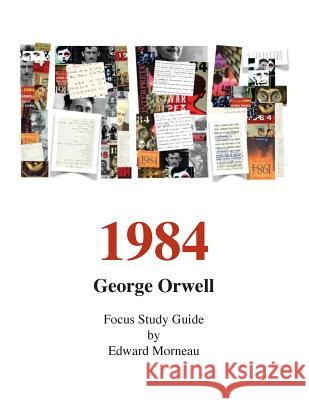George Orwell's 1984: A Focus Study Guide » książka
George Orwell's 1984: A Focus Study Guide
ISBN-13: 9781508813040 / Angielski / Miękka / 2016 / 214 str.
1984 George Orwell Focus Study Guide is one in a series of educational units designed to help students with an understanding and appreciation of great and still relevant literature. Teachers new to the profession and seasoned teachers will find practical tools for reading Orwell's text as well as related materials that amplify his ideas. This guide is different from others in its approach to 1984 as a work that needs to be read and understood on a number of levels. As a reading experience it is the touchstone of most dystopian literature and uses the 'anti-utopian' codes in maximally efficient ways. As a satire, its extremes are imaginative, but critical in understanding the nearly unbelievable abuses of power of which people are capable and for which history has its political progenitors and practitioners. 1984 is also about the power of language as it is related to the way we think and express ourselves. And because language is at the root of dystopia's deception, the extremes of propaganda and their effects are revealed through Orwell's text and characters in ways that deserve closer scrutiny. This guide also moves the student from a familiar acquaintance with Orwell's powerful story to a series of ways students can assess the value of 1984 in contemporary, scholarly, and critical ways. When Edward Snowden leaked the NSA memos regarding the abuse of privacy, sales of 1984 spiked, reminding us that, while Orwell claimed his book was not a prophecy, it is, as he asserted, 'a warning.' As one of 1984's more powerful motifs, the idea of revisionism informs the narrative throughout. From the redacting of war heroes from record performed by Winston in the Ministry of Truth, to making obscure and eliminating language itself, Orwell instructs us to look deeply into the well of human experience and language that invigorate self-delusion and political deception. Included in this unit are high stakes testing questions geared to retention. While critics of high stakes testing decry rote learning as an inauthentic measurement of achievement, I provide some common sense assessments that test a basic knowledge of 1984. It is expected through contemplative and research-based writing, students will more deeply explore the profound themes and consequences of Orwell's novel. The writing assessments and suggested assignments are modeled throughout. As most schools have district-based rubrics, I choose the modeling paradigm as it has more universal applications for composition and critical thinking. Writing is possibly the greatest proof of scholarship, and any achievement in scholarship should lead to an exploration of knowledge beyond this text. Hopefully the resources included in this focus guide will encourage students to consider the greater context of literature. The "idea" of Orwell as a literary and political abstraction is permanent in our social and political culture, as the term Orwellian has taken prominence in all manner of conversation, for better or worse. ..". We] commonly use the term 'Orwellian' in one of two ways. To describe a state of affair as 'Orwellian' is to imply crushing tyranny and fear and conformism. To describe a piece of writing as 'Orwellian' is to recognize that human resistance to these terrors in unquenchable" (Hitchens 5). It is my hope that this guide help clarify these distinctions. Beyond the text, Orwell's thoughts on language, fascism, realpolitik, and his satirical theories regarding the structures of human behavior reveal a mind that is critically engaged. This unit is an attempt to pass on this engagement to the student.
Zawartość książki może nie spełniać oczekiwań – reklamacje nie obejmują treści, która mogła nie być redakcyjnie ani merytorycznie opracowana.











